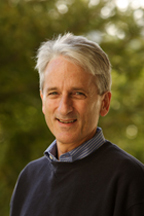Grants Fund Research on Faith, Science
By
Westmont
 Westmont biology professor Jeffrey Schloss has been awarded two grants to research complex issues related to science and faith. Westmont is one of 20 institutions awarded a $20,000 Science and Transcendence Advanced Research Series (STARS) grant. Schloss will study the effects of religious worship on the human bonding hormone, oxytocin. The grant from the Center for Theology and the Natural Sciences (CTNS) allows Westmont to work with professors from three other research institutions on “Organic Embodiment of Transcendent Moral Commitments.”
Westmont biology professor Jeffrey Schloss has been awarded two grants to research complex issues related to science and faith. Westmont is one of 20 institutions awarded a $20,000 Science and Transcendence Advanced Research Series (STARS) grant. Schloss will study the effects of religious worship on the human bonding hormone, oxytocin. The grant from the Center for Theology and the Natural Sciences (CTNS) allows Westmont to work with professors from three other research institutions on “Organic Embodiment of Transcendent Moral Commitments.”
Schloss will work with Pulitzer-prize winning author Edward Larsen, Pepperdine University School of Law; Stephen Post, Case Western Reserve University School of Medicine; and Paul Zak, Claremont Graduate University.
Schloss says oxytocin has been found to act in the brain to support such things as the attachment between mothers and infants, husbands and wives, and even social cooperation. Research by Zak recently discovered that oxytocin increases with trust in many situations.
“Religious faith has been criticized as destructive to human well-being by a number of prominent scientists recently while other studies have found benefits to faith,” Schloss says. “But nobody has explored possible causes, which is what we’re interested in. Are we built biologically to flourish when worshipping?”
Along with the scientific research, the team will be writing for mainstream sources to promote a positive view of the relationship between faith and biological science.
“Many prominent writers, both secular and Christian, promote a ‘warfare’ view of science and faith: choose one, reject the other, or domesticate one by the authority of the other,” Schloss says. “We believe faith and science can and should be celebrated in their full integrity and are necessary for intellectual progress and social harmony.”
STARS sponsors ground-breaking interdisciplinary research on the ways science, in light of philosophical and theological reflection, points towards the nature, character and meaning of ultimate reality.
Schloss also received a $97,000 grant from the John Templeton Foundation to support a one-and-a-half year project on “Evolutionary Theory, Religious Belief, and Life’s Big Questions.”
The grant will help support a book, a series of talks and articles, and an international conference to be held in Santa Barbara.
The mission of the John Templeton Foundation is to serve as a philanthropic catalyst for discovery in areas engaging life’s biggest questions, from explorations into the laws of nature and the universe, to questions on the nature of love, gratitude, forgiveness, and creativity.
Filed under
Academics, Giving